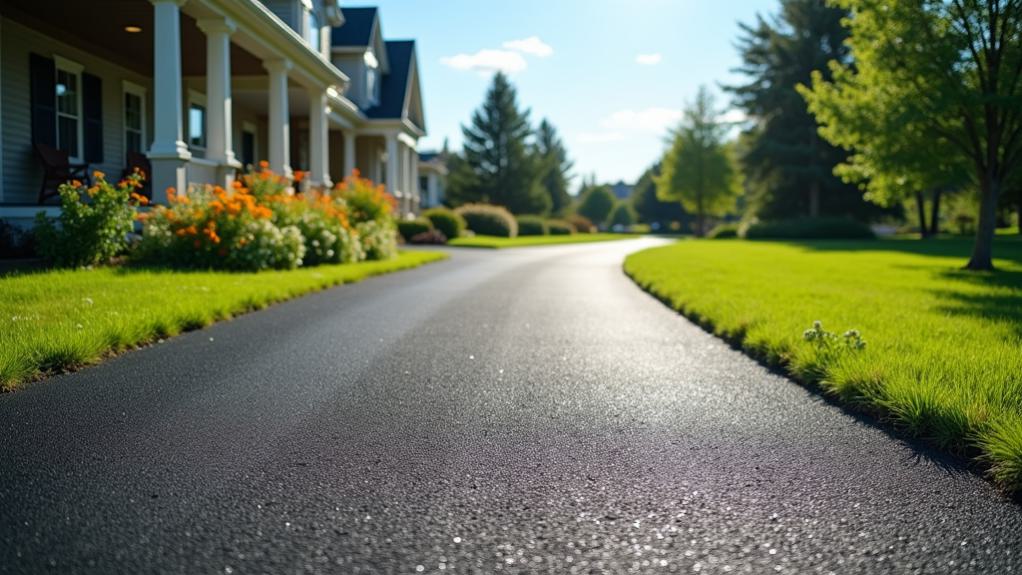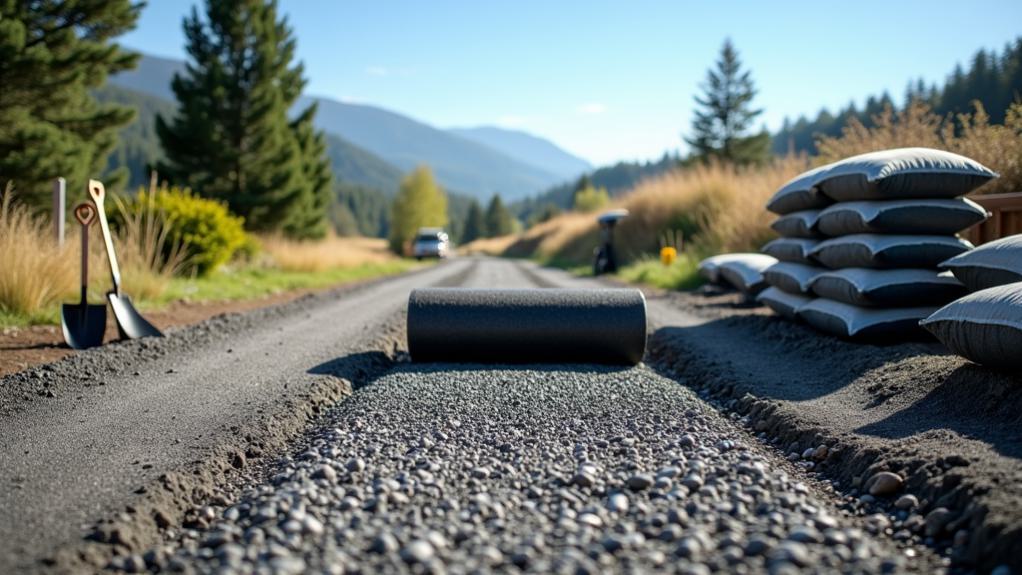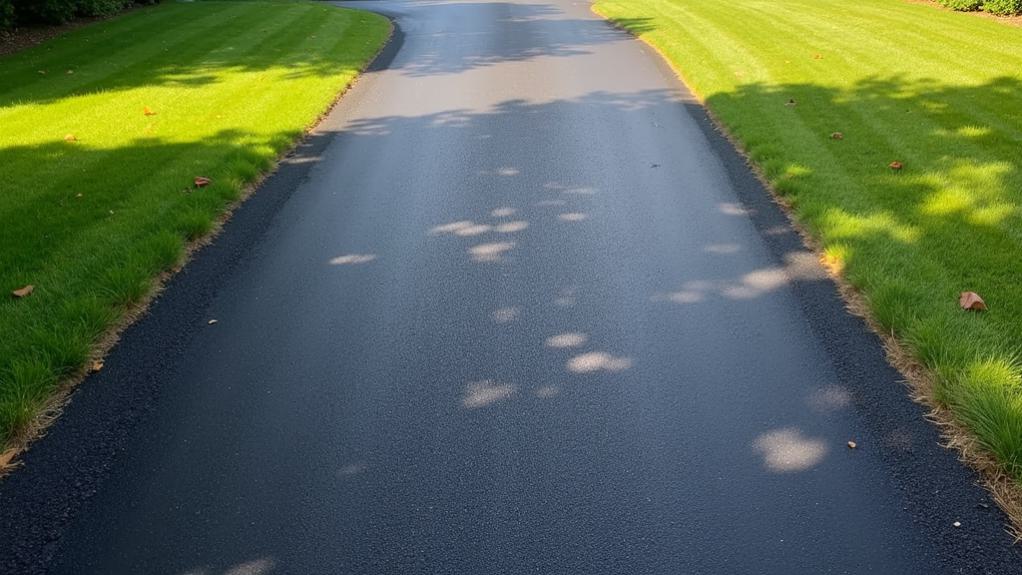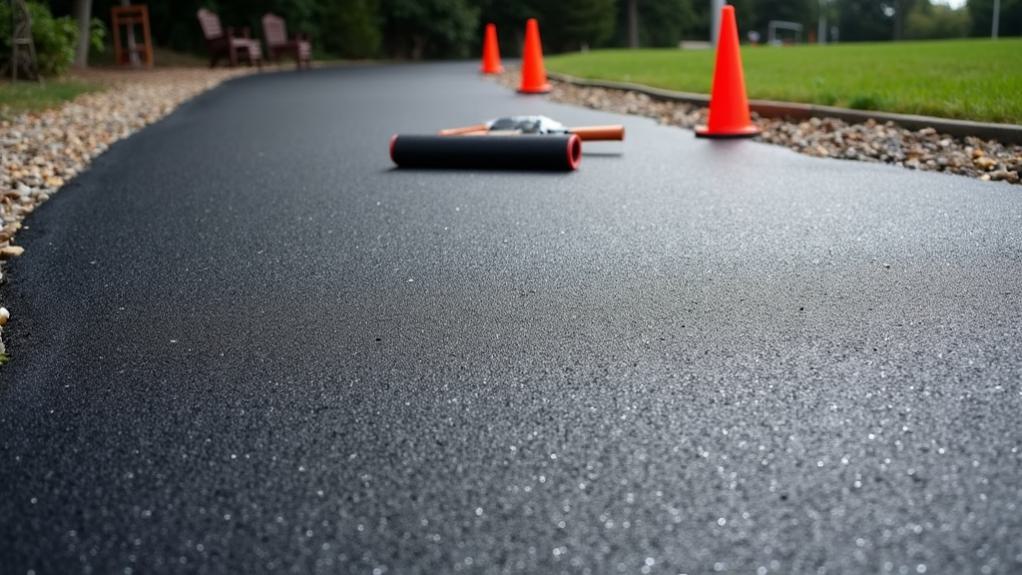Asphalting a driveway usually takes you 1 to 2 days for smaller residential projects, while larger commercial ones might require up to a week. However, the entire process includes planning, site preparation, and curing times, which can extend the overall timeline.
You’ll need to anticipate 2 to 4 weeks for planning, and 1 to 2 weeks for site prep, depending on conditions. After paving, initial curing requires you to avoid traffic for 5 to 7 days, with full curing taking up to 30 days. Understanding these phases can help you better manage expectations and timelines.
Key Takeaways
- Small residential driveways typically take 1 to 2 days for asphalt installation, while larger commercial projects may extend to a week.
- The planning phase for an asphalt driveway can take 2 to 4 weeks, vital for a smooth execution.
- Site preparation usually lasts 1 to 2 weeks, depending on existing conditions and required grading.
- Initial curing time requires avoiding traffic for 5 to 7 days, with full curing extending up to 30 days.
- Weather conditions can significantly impact both the paving process duration and the curing times.
Overview of Asphalt Driveway Timeline

When planning your asphalt driveway installation, understanding the timeline is vital for a smooth process. The entire project typically takes about 1 to 2 days for small residential driveways, which includes both paving and initial curing.
However, before the actual paving begins, you should allocate 2 to 4 weeks for planning, depending on the complexity of your project and the coordination required with a professional contractor. It’s advisable to seek help from experts like Nathan’s Paving for a thorough range of paving services and competitive rates.
Site preparation is a significant phase, usually lasting 1 to 2 weeks. This duration can vary based on the condition of your existing foundation. Once the site is ready, the paving process can be completed in just a few days.
Keep in mind that larger areas, like commercial driveways, may extend the paving time to a week.
After paving, it’s important to take into account the curing time of the new asphalt. You’ll need to avoid traffic for the first 5 to 7 days to guarantee proper initial curing.
Full curing can take up to 30 days, which is important to remember before applying sealcoating. By understanding this timeline, you can better prepare for your asphalt driveway installation.
Importance of Planning Phase
Proper planning is key to a successful asphalt driveway installation.
The planning phase typically spans 2 to 4 weeks and is vital for guaranteeing your paving project runs smoothly. Engaging with a trusted asphalt paving service like Nathans Paving can streamline this process, as they offer easy process to get a free quote and help you avoid delays by clearly outlining steps and timelines.
Here are four essential components of this phase:
- Site Conditions: Evaluating the terrain and existing features helps determine the best approach for installation.
- Consultation and Estimate: Engage with contractors early to secure availability and receive detailed estimates.
- Permits: Obtain any necessary permits to comply with local regulations, which can affect your project timeline.
- Communication: Maintain clear communication with all stakeholders to guarantee everyone understands their roles and responsibilities.
Preparation Steps Required

Preparing your driveway for asphalt is an important step that can greatly impact the longevity and performance of your new surface. The preparation phase typically takes 1-2 weeks, depending on your site’s condition and the extent of work needed.
Start with thorough site preparation, which involves clearing debris from the area. If your foundation is stable, this may suffice, but you’ll need to take into account old asphalt removal if it’s damaged. Utilizing high-quality materials during this phase is essential for achieving the best results.
Proper grading and sloping are significant during this phase to guarantee adequate drainage, preventing issues like standing water and cracks later on. An aggregate sub-base is then laid to support the weight of vehicles and provide a solid foundation for the asphalt. This step is fundamental, as it establishes the durability of your driveway.
Effective communication with paving contractors throughout the preparation phase is important. Discussing the necessary steps guarantees that you don’t encounter delays later in the project.
Duration of Paving Process
Completing the paving process efficiently is vital for minimizing disruption to your routine. Generally, you can expect the time to lay an asphalt driveway to take about 1 to 2 days for smaller projects.
However, if you’re dealing with larger commercial driveways or parking lots, the paving process may extend to several days or even a week.
Several factors can influence how long it takes:
- Site Conditions: The existing condition of your site can affect the duration.
- Weather Conditions: Rain or extreme temperatures can lead to delays in the paving timeline.
- Paving Contractor Efficiency: The experience and resources of your paving contractor play a critical role in speeding up the process.
- Planning and Preparation: Proper planning can greatly reduce interruptions and keep your project on schedule.
Understanding these elements will help you gauge how long it takes to complete your new driveway.
Understanding Drying and Curing

Understanding the drying and curing process of newly paved asphalt is essential for guaranteeing its longevity and performance.
The drying time for your new driveway typically takes about 2-3 days under normal weather conditions before it’s safe for traffic. However, it’s important to avoid walking or parking on the asphalt during the first 5-7 days to allow for proper initial curing. This period is critical, as it helps the asphalt develop strength and stability.
Curing is a longer process that can take up to one year, where the material continues to harden and gain durability.
Be mindful that weather conditions, such as high temperatures or rain, can greatly impact both drying and curing times, potentially extending the waiting period.
After about 30 days of curing, you can consider sealcoating your asphalt driveway. This step enhances protection against wear and extends the driveway’s lifespan.
Factors Influencing Installation Time
After ensuring your new asphalt driveway has adequately dried and cured, the next step is to reflect on the factors that influence installation time. Understanding these elements can help you set realistic expectations for your project.
Here are four key factors to bear in mind:
- Project Complexity: The size and condition of your existing driveway can notably impact installation time. Smaller residential jobs usually take 1-2 days, while larger projects may require more time.
- Site Preparation: If extensive grading or debris removal is needed, this can add an additional 1-2 weeks before the paving process even starts. Proper site preparation is essential for a successful installation.
- Weather Conditions: Rain or extreme temperatures can delay both the paving and curing processes. Be sure to monitor weather forecasts to avoid unexpected delays.
- Paving Crew Experience: The efficiency of your paving crew and the quality of their equipment can affect how quickly the paving process goes. An experienced crew can expedite the job, particularly for smaller commercial driveways.
Keep these factors in mind to better understand your asphalt driveway’s installation timeline.
Maintenance and Longevity

Proper maintenance is fundamental for maximizing the longevity of your asphalt driveway. Regular upkeep can extend its lifespan, which typically ranges from 20 to 35 years, with sealcoating every 3 to 5 years being a significant step. This process protects the surface from UV rays and weather damage, thereby preventing deterioration.
It’s essential to address small cracks and potholes promptly. Neglecting these issues can lead to more extensive damage and costly repairs. Conducting regular inspections allows you to identify potential problems early, enabling timely repairs that can save you money in the long run.
Additionally, maintaining proper drainage around your driveway is imperative. Water infiltration is a leading cause of foundation failure, so guaranteeing that water drains away from your asphalt is fundamental for its longevity.
Be vigilant for signs of severe damage, such as alligator cracking, which may indicate the need for replacement. Ongoing maintenance and monitoring are key to keeping your asphalt driveway in excellent condition.
Final Thoughts on Scheduling
When scheduling your asphalt driveway installation, clear communication is essential for a smooth process. You need to understand how long it will take and the various phases involved. Proper planning typically takes 2 to 4 weeks, largely influenced by the preparation phase, which lasts 1 to 2 weeks.
Here’s a concise breakdown to take into account:
- Preparation Phase: Site clearing and foundation work can greatly affect the timeline.
- Paving Process: Small residential driveways can be paved in just a few days, while larger jobs may take up to a week.
- Initial Curing: After paving, expect a drying period of 2 to 3 days before resuming traffic.
- Full Curing: Remember that complete curing can extend up to 30 days.
It’s a good idea to maintain effective communication with all stakeholders throughout the project. This minimizes the chances of delays and guarantees everyone is aligned on expectations.
Conclusion
In the grand scheme of home improvement, paving your driveway is a small yet impactful investment. With proper planning and understanding of the installation process, you can transform your space efficiently. Remember, the time spent now guarantees lasting durability and enhanced curb appeal. So, when you think about your driveway, consider it not just as a surface, but as the foundation for countless memories. Prioritize your scheduling, and enjoy the benefits for years to come.
